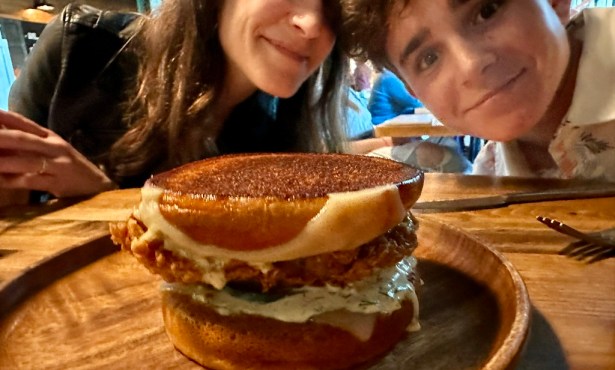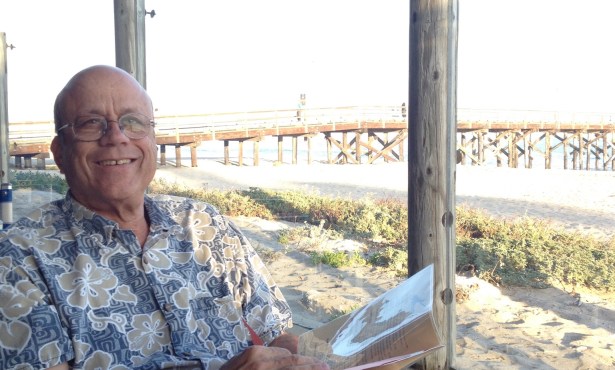Discovering the Coastal Ocean Builds Self-Esteem
Educational Charter Trips May Help Reduce Isolation
Stand on any beach scalloping the coastal shelf on which the South County sits and feel the Santa Barbara Channel’s call to come out and play … or fish for supper … or escape the human-built environment, and, if lucky, see dolphins cavort.
Many, particularly people who are disabled or who care for someone who is, will hesitate at the water’s edge; some will feel a twinge of fear. It is a big patch of ocean, even when the islands appear close to shore.

The sea is powerful and capable of quickly shifting moods when winds turn from benign to threatening. Respect for and understanding of such changes are required to experience the marine world safely. Yet a family-rooted Goleta nonprofit has found a way to introduce the physically and mentally impaired to learning opportunities on the water, often with inspiring results for crew and passengers.
Licensed captains David Bacon and his daughter, Tiffany Vague, have invested their skills and livelihoods — primarily the six-passenger sport fishing boat WaveWalker — into creating a venue for some who could benefit most from exposure to sea life and water lore. Working through a number of the area’s social support groups and with families of autistic or developmentally delayed youngsters, they discovered that educational charters could build coping skills and self-esteem.
It all started when Vague took her 3-year-old autistic son on a cruise with her father through the Santa Barbara Harbor in 2007. “My son would not talk until his first boat trip,” she said. About 20 minutes into the trip, he pointed at a sea lion and asked the stunned adults, “What’s that?”
As the little boy began to react to the environment, Bacon and Vague realized that their harbor sojourn could penetrate the wall of withdrawal that surrounds autism disorders. It might also be effective against the social isolation of the frail elderly, foster children, and traumatized survivors of domestic violence.
Sharing their observations later established both were on the same wavelength: “We could help a larger group than the autistic,” she recalled. That humanitarian impulse led to securing an educational nonprofit status from the Internal Revenue Service. With cofounder Ramona Lisa Mcfadyen, the team created Seafaring Opportunities for Those in Need, or Softin.
CALM (Child Abuse Listening and Mediation) of Santa Barbara and the Alpha Resource Center of Ventura are two of the clients that have sent them passengers over past years, the skippers said. “We were one of the first organizations to sign (an agreement) with Softin,” confirmed Cecilia Rodriguez, executive director of CALM, which attends to adults and children enmeshed in domestic violence.
“So many families we serve do not have quality time together,” Rodriguez added. The Softin trips are “special treats” because they are often a first-time experience for parents and children, she said. Her staff frequently lauds the empowering qualities of the charters.
Much information is packed into the two- to three-hour charters, which are tailored to each small group’s needs. The curriculum may include water safety, basic navigation, vessel shape and function, sport fishing (catch and release), wildlife identification, water quality issues, marine debris, waterfront careers, and more. Details are available on Softin’s website.
“We generally do not go too far outside the harbor because that can be a fear factor for some,” said Bacon, who runs sport fishing charters and owns a small Santa Barbara tackle shop called Hook, Line and Sinker.
There is no regular schedule for the free Softin charters, and the weather can play a huge role in the WaveWalker’s outings.
The only other restriction is that the small powerboat cannot transport persons who use motorized wheelchairs, the captain explained. While the crew helps passengers in boarding, individuals should be partially ambulatory and able to assist in getting on and off the boat.
Returning to dock, passengers have usually “opened up,” Bacon said. “We listen to the passengers and often learn that they heard what we said, even if they were active and seemed not to at the time,” he recalled. “The good-byes are warm and endearing. They can bring tears to the crew.”
Such experiences with the passengers are the only compensation collected by the WaveWalker’s captain and crew. “We do not charge for these trips,” affirmed Bacon.
Softin relies on individual donations and an annual fundraising car show — scheduled for August 19 this year — at the Santa Maria Fair Park to meet part of its expenses. “Mostly, it comes out of my pocket,” said Bacon with a smile.



